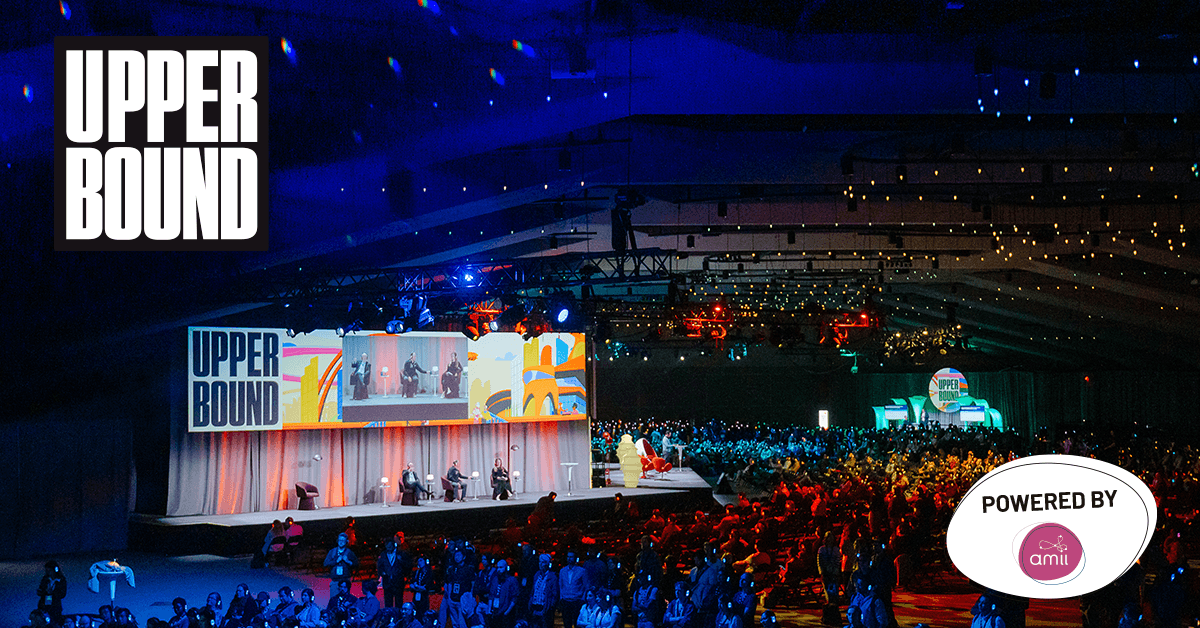“AI is at the point where it is going to disrupt every industry in the world, and it is at an inflection point in the construction industry.”


At this year's Upper Bound conference, AI researchers, engineers, and entrepreneurs gathered to share the latest advancements and opportunities that artificial intelligence offers in their fields.
Construction is one of the largest industries globally and has not yet seen the kind of productivity benefits from automation that other sectors have. But this year, speakers spoke about how artificial intelligence has the potential to change that.
Upper Bound 2025 AI in Construction
Key Takeaways
Increasing Complexity
Modern construction projects are increasingly complex, with a greater focus on sustainability and safety.
Less Automation
Challenges in the industry mean it has not seen the same amount of automation as other industries.
Unique Challenges
AI is well-suited to address the unique challenges in the construction industry and increase productivity.
Defining the Problem
To succeed, AI tools need to be designed with a problem in mind.
Increasing Efficiency
Companies are already using AI to increase efficiency and reduce costly delays.
![]()
From Insight to Impact: Unlocking the Power of AI in Construction and Industrial Operations
Ali Golabchi, associate director of the Construction Innovation Centre, talked about some of the current challenges facing the construction businesses and offered advice for innovators and entrepreneurs looking to create impactful AI-enabled tools in the industry.
The modern construction industry is facing an increasingly complex environment, Golabchi says.
Construction outfits are dealing with labour challenges and lowered productivity, while at the same time, projects are becoming increasingly large and complex. As well, the industry, the need for enhanced worker health and safety, as well as sustainability goals, can create a lot of pressure on businesses. Golabchi sees a lot of potential for AI advancements that will help deal with these challenges.
But AI development needs to be done in a certain way to have an impact, Golabchi says. Too often, he finds that companies promising groundbreaking AI solutions put a focus on building a product and then looking for a problem to apply it to, instead of the other way around.
“Are you solving a real problem, or is it just cool?
“Because it is cool to have an AI solution. But you need to focus on the problem you are solving and the value you are providing.”
Trying to solve the wrong problem frequently ends industry-innovator collaborations prematurely, Golabchi says. Other factors, like misaligned timelines and academics and industry working in silos without proper communication also frequently lead to failure.
To succeed, Golabchi says companies need to adopt a problem-based mindset, instead of using AI for the sake of AI. As well, he said it was essential to not wait for perfection when it comes to AI tools — instead, produce something that has some value, and then iterate and improve on it.
Alberta’s Opportunity in Construction, Artificial Intelligence and Robotics
In his session, Alberta’s Opportunity in Construction, Artificial Intelligence and Robotics, Bruce Alton, CEO & Co-founder of RoBIM Technologies, argued that the construction industry is a particularly challenging space to adopt disruptive technologies like artificial intelligence, but it also offered immense potential. The construction industry is the largest sector in the world, worth $13 trillion and providing 8% of employment worldwide.
But unlike other industries that have seen productivity gains due to technology and automation, productivity in construction has remained flat, or even negative, for decades. Alton says the industry is fragmented and competitive, not geared towards cooperation. Alton also notes that every construction job is a unique one: even if a builder is constructing 100 identical houses in a neighbourhood, differing site conditions mean not one of them is exactly the same. This makes it very difficult to automate parts of the construction process.
Up until now. Alton says artificial intelligence could be disruptive to the industry, offering smart automation that could adapt to the particular needs of builders.
“You may ask what has changed. Well, AI has changed.”
He then showcased some machine learning technologies offering solutions to some of the unique problems within the industry. This includes using generative AI to automatically start rendering design concepts based on simple sketches made by designers, offering a more immediate look at what a finished product might look like, and speeding up the design process greatly.
Another one of his examples highlighted technology to generate the routes for the electrical, fiber optic, and other types of cables for large commercial and industrial builds. Larger projects can call for kilometres of cable, and planning it all out in an efficient and safe route can delay a job for months, which can be reduced with AI tools.
Alton discussed his own experience with the company he is involved with, RoBIM Technologies, which aims to help construction industry players automate parts of the building process by providing AI-enabled modular fabrication units, which would allow off-the-shelf robotic arms to build components of a construction project, which could then be assembled at the construction site, saving both time and labour.
“AI is at the point where it is going to disrupt every industry in the world, and it is at an inflection point in the construction industry.”
Upper Bound Startup Pitch Competition: Bidblox
Finally, Upper Bound’s Startup Pitch competition gave another view as to how AI-enabled tools are transforming the construction industry.
As part of her three-minute presentation, Lisa Mohapatra pitched Bidblox, a tool that helps construction companies with the early planning phase of their projects to make more accurate, competitive bids.
The platform, which was first established in July 2024, provides real-time information on materials costs, as well as predictive cost models to make bidding more accurate. Mohapatra noted that they are in the process of building a real-time baseline pricing engine, something that doesn’t yet exist in the construction market.
